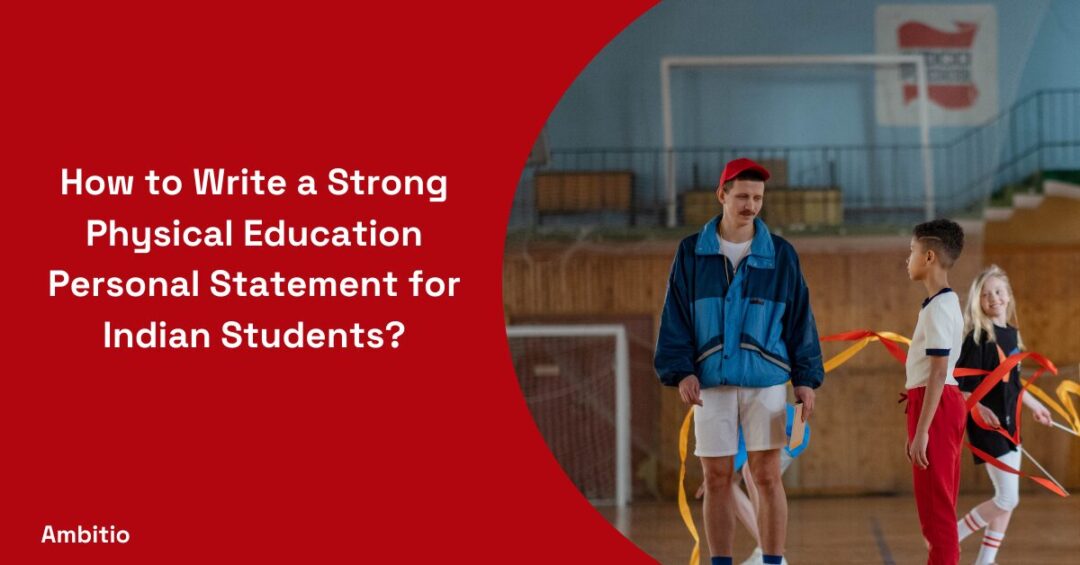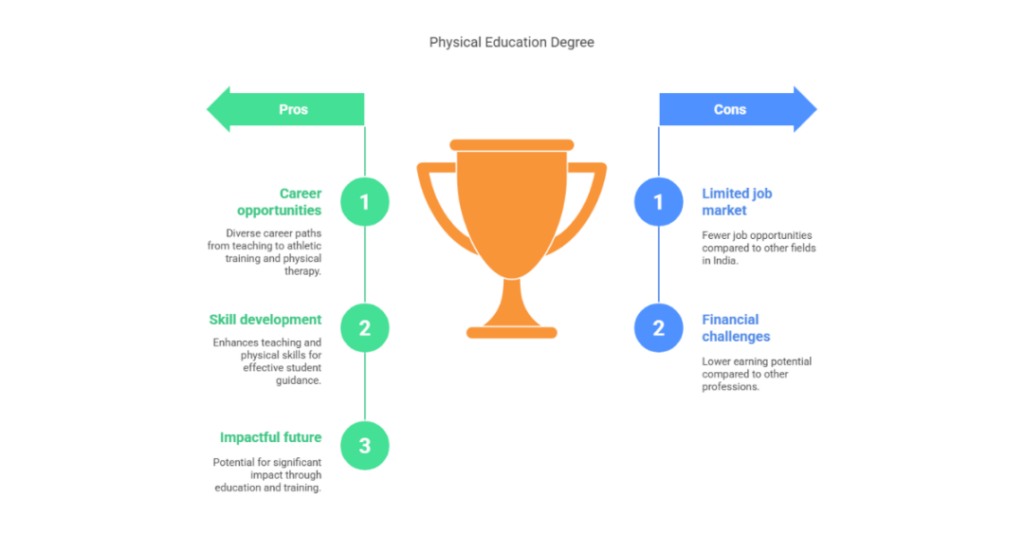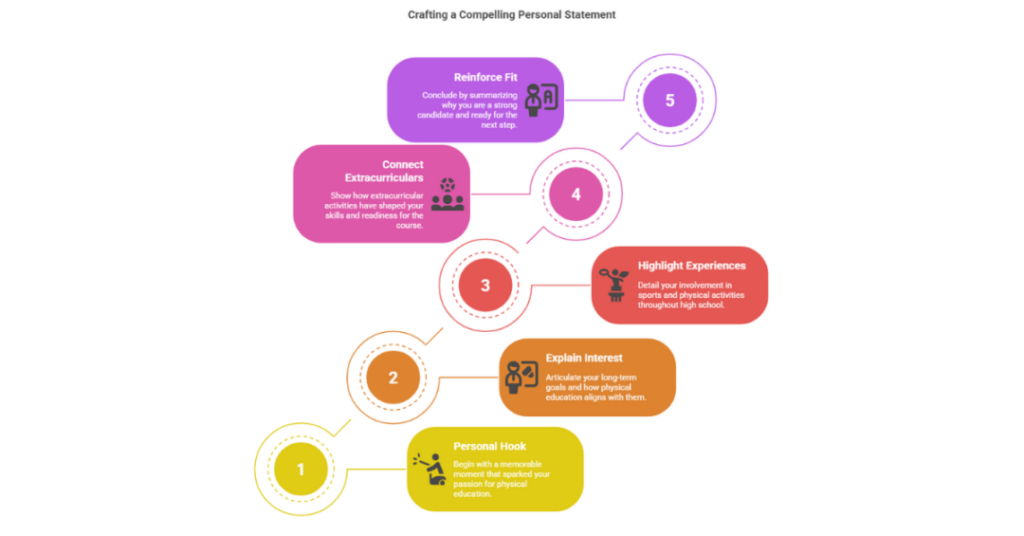26 May 2025
7 minutes read
How to Write a Strong Physical Education Personal Statement for Indian Students?

Key Takeaways
- A physical education personal statement should go beyond “I love sports” and reflect real experiences, teaching skills, and future goals.
- Strong statements connect academics, leadership roles, and voluntary work with global program expectations.
- Indian students should highlight adaptability, inclusivity, and a lifelong vision for promoting health and fitness.
Research shows that over 65% of Indian students writing their physical education personal statement simply go with clichés like “I love sports” or “I played football at school.” Universities are looking for more than this. They require evidence of your ability to teach students, promote physical health, and lead fitness programming across the life span.
If you are really serious about becoming a physical education teacher or a practitioner of sports medicine, the physical education personal statement for university applications must show you have genuine experience, background knowledge, and a commitment to help others adopt a healthy and physically active lifestyle.
Why Indian Students Should Prioritize a Physical Education Degree?
For Indian students, a degree in physical education offers more than just playing sports, it builds a real career in physical education. From PE teacher roles in secondary school to becoming an athletic trainer or entering physical therapy, the field blends fitness activities, teaching physical skills, and guiding school-level learners.

A strong physical education personal statement backed by experience working, hours of voluntary work, and passion to help students achieve their goals can lead to a fully qualified and impactful future.
5 Questions to Ask Yourself Before You Start Writing an Essay on Physical Education(PE)
Before Indian students begin writing a physical education personal statement, it’s crucial to pause and reflect. A rushed free essay full of vague claims about an interest in sports won’t stand out.
Admissions teams want to see thoughtful, real answers, backed by experience, purpose, and a clear vision for studying physical education. These five questions will help you organize your ideas and make sure your statement of purpose is sharp, sincere, and tailored to your chosen degree course.
1. Why do I want to study this course or subject?
Think beyond just liking PE classes or playing school football. Do you see yourself as a future physical educator or someone passionate about teaching and curriculum in school physical education? Mention how studying sports science aligns with your goal of promoting physical activity and self-esteem in young people.
2. How have my studies helped prepare me for this degree course?
Highlight relevant subjects like GCSE P.E., biology, or health. Talk about what you learned in physical education lessons or secondary school that shaped your understanding of physical fitness, healthy eating, or athletic training. Show that you’ve already begun building the academic foundation for studying physical education.
3. What experiences have I had outside of school that support this choice?
Whether it’s leading your school basketball team, helping with netball or school sports, or earning a Community Sports Leadership Award (CSLA), real-life experience matters. Include hours of voluntary work, involvement in primary school coaching, or even first aid training — these prove you’ve taken initiative.
4. What personal qualities or skills make me a good fit for this subject?
Admissions officers look for leadership, empathy, and teamwork. Maybe you’ve been a role model in fitness activities or helped make physical activity more accessible in your school. If you want to become a fully qualified PE teacher, show that you can connect with all age groups.
5. How will this course help me achieve my future goals?
Whether your dream is successful teaching, becoming a physical educator, working in sports as well as athletics, or entering education and physical careers like athletic training or health promotion. Make it clear. Use this to tie your physical education personal statement back to the bigger picture of helping others live a healthy life and participate in physical activity.
Step-by-Step Guide to Writing Your Physical Education Personal Statement for Undergraduate Universities
Writing a strong physical education personal statement can be a game-changer for Indian students applying to undergraduate uni’s. With just 4000 characters to showcase your story, it’s essential to go beyond listing achievements in P.E or saying you were involved in sport.

Instead, build a statement that captures your journey throughout high school, your passion for physical education classes, and why physical education would be the perfect course for you.
1. Start with a Personal Hook That Shows Your Connection to Physical Education
Begin by sharing a moment when you realized the impact of taking part in P.E — maybe through school football or leading a warm-up session in physical education classes. This helps the reader connect with your motivation from the very first line.
2. Explain Why You Want to Study Physical Education at the Undergraduate Level
Talk about your long-term goals and how physical education would prepare you to reach them. Make sure to link your interest in physical fitness, teaching, or sports science with what undergraduate uni’s are offering.
3. Highlight Your Experiences Throughout High School
Whether you led your basketball team, helped organize P.E tournaments, or mentored younger students, detail how you stayed involved in sport. This proves your dedication and consistent effort throughout high school.
4. Connect Your Extracurriculars with Your Future Ambitions
Mention how taking part in clubs, matches, or even coaching roles shaped your confidence, communication, and leadership skills. These show you’re not just active — you’re ready to thrive in a classroom and on the field.
5. Conclude by Reinforcing Your Fit for the Course and Career Path
End your physical education personal statement by summarizing why you’re a strong candidate. Show you’ve reflected on your journey, researched the course, and are genuinely ready to take this next step in your academic and professional life.
7 Tips to Tailor Your Personal Philosophy of Physical Education for Global Programs
Crafting a physical education personal statement for global programs requires more than passion, especially for Indian students competing for top international spots. Whether you’re targeting the University of Chester or the University of North Carolina, your statement should reflect global readiness, clear career goals, and cultural awareness.
Here’s how to tailor your personal philosophy for universities that value both academic performance and a deep commitment to physical education.
1. Show a Holistic View of Physical Education
Global programs look for candidates who understand that physical education goes beyond just sports. Talk about promoting mental well-being, self-esteem, and lifelong health, not just performance or winning.
2. Align Your Statement with Global University Expectations
Different universities like the University of Birmingham or the University of Auckland have unique values. Read their physical education program pages to reflect their teaching approach and link it to your personal philosophy.
3. Demonstrate English Language Preparedness and Academic Readiness
Top global schools expect strong scores in IELTS, TOEFL, GRE, GMAT, ACT, or SAT. Mention your performance briefly to show you’re academically equipped to handle rigorous coursework and communicate effectively.
4. Emphasize Inclusivity and Adaptability
Your philosophy should reflect how you’d adapt activities for different age groups, fitness levels, or cultural contexts. This shows your readiness to teach students globally, not just in a local or Indian setting.
5. Link Your Experiences to Global Education Goals
Whether you’ve coached school football, volunteered, or led fitness activities, relate those to broader outcomes like teamwork, resilience, and leadership values appreciated by undergraduate uni’s worldwide.
6. Reflect on Lifelong Impact, Not Just School Sports
Mention how your teaching would help students live a healthy life and participate in physical activity beyond school. A strong philosophy includes long-term physical, mental, and emotional development.
7. Highlight Cultural Awareness and International Readiness
As Indian students, acknowledging cultural diversity in physical education classrooms is vital. Talk about your openness to new ideas, global standards, and how you’ll contribute to inclusive physical education environments abroad.
Physical Education Personal Statement Examples
A well-written physical education personal statement is your chance to move beyond just listing achievements and actually show admissions teams who you are.
Below is a personal statement example from a successful Indian student who gained admission to an undergraduate physical education program in the UK.
Sample Personal Statement (Excerpt from Indian Applicant – 350 Words)
From leading warm-up drills in school football matches to organizing P.E. classes for younger students, I’ve always found purpose in creating environments where others feel encouraged to participate in physical activity. My passion for movement grew beyond the field — it became about helping others build confidence, resilience, and physical fitness through sport.
Growing up in India, I was actively involved in sport throughout high school — football, netball, and athletics shaped not just my physical health but my leadership skills. As a team captain, I learned how to manage different age groups, resolve conflict, and create inclusive spaces for students of all abilities. These early experiences inspired me to pursue a degree in physical education, aiming to become a fully qualified physical educator.
Academically, I studied biology and physical education at the GCSE level, gaining a strong foundation in anatomy, movement science, and the link between healthy eating and performance. I also completed over 80 hours of voluntary work at a primary school, assisting in physical education lessons and learning how to adapt teaching for younger learners.
I believe a good physical educator is not just a coach, but a role model — someone who promotes teamwork, self-esteem, and long-term wellness. My goal is to help students live a healthy life, develop critical life skills, and find joy in taking part, not just winning.
With this statement of purpose, I’m applying to your program not just as someone who wants to study sports science, but as someone who wants to teach, lead, and make school physical education more meaningful for the next generation.
Insights: What Makes This Statement Work?
- Transitions like “growing up in India,” “academically,” and “I believe” guide the reader smoothly.
- The tone is reflective, focused, and confident — not overly promotional.
- It balances personal experience with professional aspiration and aligns with global teaching standards.
Conclusion
Crafting a powerful physical education personal statement is your first step toward a global career in teaching, coaching, or sports science. For Indian students, it’s a chance to showcase your passion, purpose, and potential in a way that sets you apart.
Need expert guidance to perfect your profile? Join Ambitio, India’s leading study abroad consultancy specializing in personalized profile building. From brainstorming your story to polishing every word, we help you create applications that win.
Ready to make your mark internationally? Let Ambitio be your launchpad. Click here to start your journey with expert mentorship and global success.
FAQs
What is a physical education personal statement?
A physical education personal statement is a written document highlighting your passion, skills, and experiences relevant to studying or working in physical education.
Why is a physical education personal statement important?
It helps admissions officers or employers understand your motivation and suitability for a physical education program or role.
What should I include in my physical education personal statement?
Include your experiences, achievements, skills, and reasons for choosing physical education as a career or field of study.
How can I make my physical education personal statement stand out?
Showcase unique experiences, demonstrate leadership, and reflect on how physical education has impacted your life.
How long should a physical education personal statement be?
Typically, a physical education personal statement should be between 400-600 words, unless otherwise specified.
Can I mention extracurricular activities in my physical education personal statement?
Yes, mentioning relevant extracurricular activities can strengthen your physical education personal statement.
Should I tailor my physical education personal statement for each application?
Absolutely, tailor your physical education personal statement to match the specific requirements of each institution or job.

You can study at top universities worldwide!
Get expert tips and tricks to get into top universities with a free expert session.
Book Your Free 30-Minute Session Now! Book a call now




























